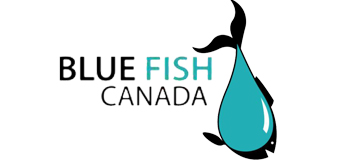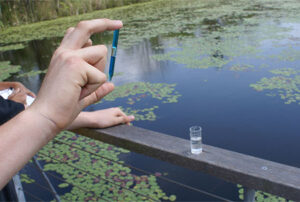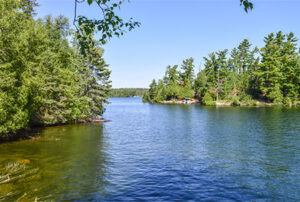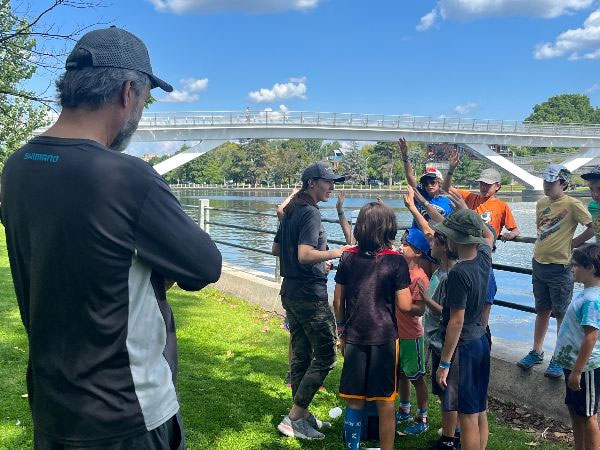Blue Fish News – September 11, 2023
BLUE FISH CANADA ANNOUNCES YOUTH OUTDOOR EXPLORATION CENTRE!
Blue Fish Canada selects Quebec’s Pontiac region to locate the new Blue Fish Exploration Centre following a year-long search undertaken with the support ofthe Pontiac’s Municipal Regional Council.
“The decision by Blue Fish Canada to establish the new Blue Fish Exploration Centre in the Pontiac is a tremendous honour and builds on our region’s commitment to sustainable development and nature conservation” says MRC Pontiac Warden Jane Toller.
Description
The new Blue Fish Exploration Centre encompasses 2.9-hectares (7 acres) of crown land complete with a 163 m2 (1,760 ft2) accessible building located in Quebec’s Pontiac region. The property includes 380 meters (1,246 feet) of pristine shoreline all sheltered under the canopy of a mature red pine forest. Level access to a sandy beach extends well into the lake.
Mission
The Blue Fish Exploration Centre will focus on:
- Conducting long term nature resilience and fishery research.
- Documenting and sharing traditional and local knowledge.
- Promoting conservation, citizen science, and stewardship.
- Facilitating youth to form healthy life-long one-health connections with nature.
- Providing outdoor access opportunities to people of all backgrounds and abilities.
“CNIB is proud to stand behind the Blue Fish Exploration Centre, championing its mission to offer youth an off-the-grid and fully accessible outdoor encounter,” says John M. Rafferty, President & CEO of CNIB. “This important initiative will enable youth who are blind, low vision, and/or deafblind to engage with scientists, biologists, and Indigenous knowledge keepers. By embracing an inclusive program approach, Blue Fish Canada is playing a key role in shaping a more equitable future – a vision that CNIB wholeheartedly embraces.”
Outdoor Youth Activities
Youth experience canoeing, kayaking, snorkeling, foraging, fishing, and working along-side fishery and watershed researchers. Citizen science activities include water sampling, capturing and tagging fish, identifying and removing invasive species, restoring riparian wetlands, and enhancing fish habitat.
“We are pleased to collaborate with Blue Fish Canada on water quality initiatives through the use of our testing methodology and equipment” Kat Kavanagh, Founder, Water Rangers
Traditional Indigenous Knowledge
Instruction includes Underwater observation, shoreline exploration, assessing fish health and sustainability, and understanding biological interdependencies. “Traditional, local, and scientific knowledge are all essential elements of Blue Fish Exploration Centre programs” says Lawrence Gunther, founder and president of Blue Fish Canada.
About Blue Fish Canada
A registered Canadian charity since 2012, Blue Fish Canada / Poisson Bleu Canada is dedicated to the future of fish and fishing. Programs blend traditional and local knowledge with science to assist youth to form one-health connections with nature.
For further information please contact:
Ian MacLeod
Communications Director
comms@bluefishcanada.ca
What’s new at Blue Fish Canada
Crown lease secured — building purchased – announcing the new Blue Fish Exploration Centre! Blue Fish volunteers have been busy throughout August and into September preparing the new fully accessible Blue Fish youth exploration centre and research station – read more in this issue’s editorial! Our work with the Ottawa Fish School wrapped with over 96 youth having received our “Get Ready for Fishing” stewardship training. A big thanks to our summer youth outdoor guides for their tremendous assistance with engaging the many youth, families and future mentors. Throughout the spring / summer. We also want to thank Water Rangers for the very well received water testing equipment; you can learn more about our collaboration to integrate fish health with water testing by visiting the link: https://www.waterrangers.ca/projects/fish-health/
The Latest Fishing, Fish Health and Fish Habitat News
Fishing:
Squabbling Over the Last Fish / Tyee
On Aug. 15, the Forest Ministry informed operators in the Skeena watershed that while steelhead returns are low, the season will go ahead. The province didn’t rule out an abrupt mid-season closure, but current projections suggest that’s unlikely. It’s not the first year that uncertainty has loomed over northern B.C. businesses that rely on steelhead fishing. With declining returns in recent years, many fear it won’t be the last. That makes it harder to attract staff, such as chefs and fishing guides, to their operations — not to mention the guests that often book a year in advance.
Why a caught rockfish is a dead rockfish — without help / Narwhal
The threat of barotrauma is one of the reasons Fisheries and Oceans Canada relies on a network of rockfish conservation areas, where fishing with a hook and line is banned to minimize rockfish catches, since even allowing catch-and-release would put the fish at risk, according to Haggarty. After decades of overfishing that saw inshore rockfish populations decline dramatically, the federal department developed a conservation strategy in the early 2000s with the goal of turning things around. Alongside establishing more than 160 conservation areas, the department added cameras onboard commercial fishing vessels for increased monitoring and lowered catch limits for recreational and commercial fishers outside conservation areas. Just a few years ago, the agency also instituted new requirements for all fishing boats to carry descending devices to help counter the dramatic consequences of barotrauma when rockfish are unintentionally caught.
It was once eastern Ontario’s ‘premier’ walleye lake — and could be again / CBC
Up until the late 1970s, Golden lake, roughly 150 kilometres west of downtown Ottawa, was considered one of the top destinations in the region for the popular game fish walleye. But the population declined sharply in the 1980s and 1990s, and then walleye fishing was halted from 2002 until 2007 so the stocks could be rehabilitated. The problem isn’t that there are no walleye in Golden Lake. According to co-chairs Don Bishop and Peter Heinermann of the Golden Lake Property Owners Association’s, it’s that the young walleye that hatch are mostly too puny to survive the vicious onslaught of millions of much larger invasive rainbow smelt.
Coho fishery shutting down on Yukon River; chum salmon also remains closed / Alaska Sporting Journal
The estimated passage of coho salmon past the Pilot Station sonar through August 28, 2023, was 28,862 fish, which is well below the median cumulative count of 109,947, and is the second lowest on record to date.
DFO raises alarm about ‘rampant illegal fishing’ in protected B.C. waters / Global
While some species of rockfish are designated “of special concern” under the federal Species at Risk Act, protected areas are meant to include all finfish.
NOAA Releases 2023 Report to Congress on Improving International Fisheries Management / NOAA
NOAA released its 2023 Report to Congress on Improving International Fisheries Management. The report identifies seven nations and entities engaged in illegal, unreported and unregulated fishing, including two nations with issues related to forced labor, and two nations that target or incidentally catch sharks without regulations comparable to those of the United States.
Fish:
‘Light of hope’: B.C. researchers say some fish surviving heat waves better than once thought / Vancouver is Awesome
An analysis of almost 250 marine heat waves has found the impacts on bottom-dwelling fish were “often minimal” and found no evidence extreme heat events had driven colder water fish toward the poles.
Signs of early success after pesticide used against invasive species in N.S. lake/ Canadian Press
There are early signs of success in the Nova Scotia government’s operation to rid a lake in the province’s east of invasive smallmouth bass. The Fisheries Department used 1,500 litres of a solution containing the pesticide rotenone in Dobsons Lake, near Canso, N.S., last September in an attempt to eradicate the species. Department official Andrew Lowles says there have been no signs of smallmouth bass in the lake and adds that native brook trout have since been observed migrating upstream in the area.
Environmental stress likely cause of fish die-off on Vancouver Island / CBC
Fisheries and Oceans Canada has found that “stressful environmental conditions” likely killed hundreds of salmon and trout in the Cowichan River in mid-July. In a statement this week, the department said the cause appears to be ;low oxygen and high pH levels in the water. “This can potentially be caused by the decay of algal growth, which appears to be more prevalent than usual this year. Excess algal growth is often related to a combination of low flows, hot, dry weather and availability of nutrients such as nitrogen and phosphorus.”
These deep-sea fish, ‘the ocean’s canaries in the coal mine,’ are feeling the heat of climate change / Globe and Mail
It was 45 degrees, a new record for this part of Vancouver Island, and the heat of the day coincided with an extreme low tide. With every couple of steps, I found another dead crab, sea star or fish. In between, hundreds of barnacles were starting to rot. I took pictures, but none did the scene justice. A billion animals died of heat exposure that week in June 2021, according to Christopher Harley, a professor at the University of British Columbia.
Rivers running pink with near-record salmon returns / Business in Vancouver
It’s going to be another dismal year for Fraser River sockeye, but the sport fishing industry is reportedly enjoying a banner year thanks to improved Chinook and coho abundance. With comments from Watershed Watch fisheries advisor Greg Taylor.
Habitat:
Ontario’s top 5 invasive species of summer 2023 / CBC
The top-five list includes grass carp, three of which were counted this year in Ontario. The first one was on the Grand River, which feeds into Lake Erie, and was found by the Department of Fisheries and Oceans. Other ;reports of grass carp have been in Fort Erie, a town on the Niagara River. The other was on the Bay of Quinte, on Lake Ontario’s north shore.
‘Marathon in a sauna’: How drought is impacting B.C. salmon / CTV
British Columbia’s prolonged drought risks damaging the salmon population for generations and has led to a series of emergency, rapidly deployed projects in an effort to intervene. The Pacific Salmon Foundation has funded four emergency projects, with more on the way, and convened a federal and provincial advisory group allowing for regulatory approval in a matter of days rather than the standard months-long process.
Water Soldier Eradication / Ontario’s Invading Species Awareness Program
Water soldier has been an on-going battle for the ISAP and our partners since its discovery in the Trent-Severn Waterway back in 2008. The plant has posed such a problem, that water soldier was listed as a prohibited species under the Invasive Species Act, 2015. Since 2008, it continues to be important to prevent the plant’s further introduction and spread to new locations. To address this, an inter-agency working group consisting of the Ontario Federation of Anglers and Hunters, Parks Canada, the Ministry of Natural Resources and Forestry, Ministry of Environment, Conservation and Parks, Trent University, and Lower Trent Conservation Authority are monitoring and tracking the spread of water soldier within Ontario’s waterbodies and undertaking a variety of control measures to prevent its spread.
WILD SALMON WATERSHEDS LAUNCH EVENTS / ASF
Wild Salmon Watersheds is a new freshwater Atlantic salmon conservation program created by ASF. Through Wild Salmon Watersheds, ASF will provide funding and resources to our partners for long-term conservation projects in watersheds where wild Atlantic salmon populations are relatively healthy. ASF’s goal is to establish 30 Wild Salmon Watersheds distributed throughout Eastern Canada by 2050. The Margaree and Cheticamp rivers in Cape Breton have been selected along with the Terra Nova River on the island of Newfoundland and the Nepisiguit River in New Brunswick as the first Wild Salmon Watersheds in Canada.
Lake of the Woods Algae Bloom 2023 is on its way / LotW Watershed Sustainability Foundation
The algae bloom on Lake of the Woods started to develop in late July and early August as usual. Blooms began in the southern Big Traverse Bay and in the Morson-Sabaskong area to the south-east. By late August, the bloom covered 34% of the lake and has progressed northward through middle channel to Oak Point. Algal blooms in Lake of the Woods typically peak in the late fall, and progress into the north-central area of the lake, peeking in late October.
EPA head says he’s ‘proud’ of decision to block Alaska mine and protect salmon-rich Bristol Bay / ABC
The nation’s top environmental official said he fully supports his agency’s decision to block a proposed gold and copper mine in Alaska’s salmon-rich Bristol Bay, even as the state of Alaska has asked the U.S. Supreme Court to overturn that action.
Indigenous:
First Nations want moratorium on placer mining / Western Investor
Placer mining is a small-scale approach to gold mining that typically involves miners using shovels or machines – backhoes and excavators — to scoop gravel and sand out of deposits in or near streambeds and then washing out gold particles.
“Placer mining destroys stream channel stability, eliminates pools, spawning beds, wetlands and other key fish habitat, and removes critical streamside shading vegetation,” says a study ;by the University of Victoria’s Environmental Law Centre. “It drastically reduces fish populations. In addition, placer mining devastates riparian habitats – amongst the most productive of all terrestrial wildlife habitats, and a rich source of medicinal plants.
Boating:
Mercury Marine launches Avator™ 20e And 35e Electric Outboards / Mercury Marine
The 20e and 35e feature many of the same innovative features as the 7.5e, including industry-first transverse flux motor technology, a vivid full-color intuitive display and an ambidextrous tiller handle. The new models offer more power and the ability to connect multiple Avator batteries to extend range and run time, plus full access to the ;Mercury Marine app with the integrated SmartCraft® Connect module. Up to four of Mercury’s new 2300Wh batteries can be connected and managed through our exclusive Power Center which safely merges power, enables communication between the batteries and outboard, and allows single point charging. The 20e can produce similar acceleration as a 5hp FourStroke outboard, while the 35e generates acceleration that is comparable to a Mercury 9.9hp FourStroke outboard.
Books:
Al and Amelia: a Fisherman, a Tag, and a Transatlantic Tuna / Hakai
Fisherman Al Anderson built an unusual fishing charter business during which he caught, tagged, and released more than 60,000 fish over his career. Amelia, one very special tuna first tagged by Anderson, was caught a remarkable three times and revealed much about the hidden lives of tuna.
Podcasts:
Hannah Harrison on Lake Ontario Commercial Fisheries and Conservation Areas / The Blue Fish Radio Show
Dr. Hannah Harrison is an expert on small scale Great Lakes fisheries and our guest on this episode of the Blue Fish Radio Show. Dr. Harrison speaks with Lawrence about Lake Ontario’s diminishing commercial fisheries and what establishing a National Marine Conservation Area could mean for fishing in general. Dr. Harrison is a professor with the Marine Affairs Program at Dalhousie University, and recently released the trailer for her new documentary “Last Boat on the Lake.”
Videos:
“Save Blind Bay” Video / Save the River
The video was produced by Emma French for Save The River. Thank you very much for your continuing hard work to Save Blind Bay – an environmental treasure. Please share this video as you wish. Save Blind Bay
Coming Up:
Talk Fish Habitat, / Fish & Fish Habitat Protection / DFO
Fisheries and Oceans Canada has posted interim “Codes of Practice” describing your obligations under the Fisheries Act during the repair, maintenance and construction of docks, moorings and boathouses. These draft codes are posted for public comment on Talk Fish Habitat until November 30, 2023.
Fall Project Grants Deadline is Approaching Fast / Freshwater Future
The deadline for Freshwater Future’s Fall Project Grants is just a few weeks away – get your application in by midnight on September 30th! If your community’s or organization’s advocacy efforts focus on protecting or improving drinking water, rivers, lakes, wetlands, shorelines, and groundwater in the Great Lakes region you may be eligible for these grant funds. Any questions regarding applications can be directed to laurie@freshwaterfuture.org or alana@freshwaterfuture.org or call, 231-348-8200.
Special Guest Feature – Special report on invasive species
Intergovernmental Platform for Biodiversity and Ecosystem Services
The report found that invasive species introduced by humans — whether by accident or not — are having serious impacts around the world. Report’s highlights include:
- Roughly 37,000 alien species have been introduced by humans globally.
- More than 3,500 of these are harmful invasive alien species.
- Thirty-four per cent of the impacts were reported in the Americas.
- Two hundred new alien species are recorded each year.
- Invasive species have played a key role in 60 per cent of plant and animal extinctions globally.
- The annual cost was roughly $423 billion US in 2019.
Not every alien species ends up becoming an invasive one, but when plants or animals (marine or terrestrial) have no natural predators, they can proliferate with impunity. In the case of the sea lamprey, roughly 6.8 million kilograms of lake trout were caught annually in the upper Great Lakes in the early 20th century; by the 1960s, after an explosion of the lamprey, only about 136,000 kilograms were harvested each year.
About us:
Subscribe to receive the Blue Fish Canada news in your inbox.
Read back issues of the Blue Fish Canada News
Please rate The Blue Fish Radio Show on Apple Podcast.
Email us your news or podcast story ideas.
Donate to Blue Fish Canada, a federally incorporated registered Canadian charity.
 Blue Fish Canada/Poisson Bleu Canada
Blue Fish Canada/Poisson Bleu Canada




